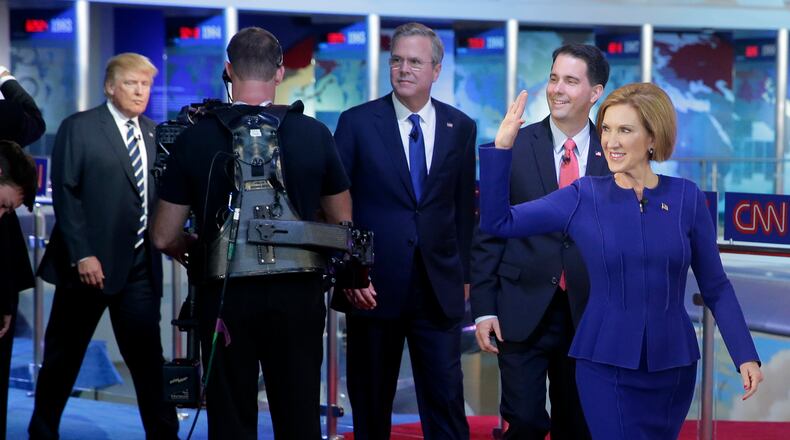SIMI VALLEY, Calif. -- One of the signature moments in the latter portion of Wednesday night's Republican presidential debate came on the topic of marijuana.
Talk initially turned to "libertarian-ish" Sen. Rand Paul of Kentucky, who says states should be allowed to legalize marijuana if they so choose. Part of his response:
"There is at least one prominent example on the stage of someone who says they smoked pot in high school, and yet the people going to -- to jail for this are poor people, often African-Americans and often Hispanics, and yet the rich kids who use drugs aren't.
"I personally think that this is a crime for which the only victim is the individual, and I think that America has to take a different attitude. I would like to see more rehabilitation and less incarceration. I'm a fan of the drug courts which try to direct you back towards work and less time in jail."
The "one prominent example" was former Florida Gov. Jeb Bush, who was, shall we say, blunt:
"That's true. And here's the deal. Here's the deal. We have -- we have a serious epidemic of drugs that goes way beyond marijuana. What goes on in Colorado, as far as I'm concerned, that should be a state decision.
"But if you look at the problem of drugs in this -- in this society today, it's a serious problem. Rand, you know this because you're campaigning in New Hampshire like all of us, and you see the epidemic of heroin, the overdoses of heroin that's taking place.
"People's families are -- are being torn apart. It is appropriate for the government to play a consistent role to be able to provide more treatment, more prevention -- we're the state that has the most drug courts across every circuit in -- in -- in Florida, there are drug courts to give people a second chance.
"That's the best way to do this."
Then Bush and Paul got into a back-and-forth about whether Bush supported cannabis oil for seizure treatments when he was governor, an issue that flared up this year in Georgia. New Jersey Gov. Chris Christie soon jumped in with his more restrictionist view: "That doesn't mean we should be legalizing gateway drugs."
But the memorable moment went to businesswoman Carly Fiorina, who brought up her own family tragedy and somehow pivoted quickly to humor:
"My husband Frank and I buried a child to drug addiction. So, we must invest more in the treatment of drugs.
"I agree with Senator Paul. I agree with states' rights. But we are misleading young people when we tell them that marijuana is just like having a beer. It's not. And the marijuana that kids are smoking today is not the same as the marijuana that Jeb Bush smoked 40 years ago.
"We do -- sorry, Barbara. We do need -- we do need criminal justice reform. We have the highest incarceration rates in the world. Two-thirds of the people in our prisons are there for non-violent offenses, mostly drug related. It's clearly not working.
"But we need to tell young people the truth. Drug addiction is an epidemic, and it is taking too many of our young people. I know this sadly from personal experience."
Fiorina wrote more about her stepdaughter in her book, Rising to the Challenge. From Time:
"The two police officers stood awkwardly in our living room," the book begins. And farther down the first page: "They asked us to sit down. Frank collapsed in a chair. I sat on the carpet next to him, my arms wrapped around his knees. The police officers said our daughter was dead, three thousand miles away."
Fiorina talks about her daughter's struggles with alcohol, prescription pills and bulimia that led to her death at age 35. It's at the end of the prologue that Fiorina first unites the personal with the political: "Lori's potential was never fulfilled but death is not the only thing that crushes potential. … What I also know is that Americans are failing to achieve their potential today."
Fiorina turned in a standout performance in the debate, as covered by our full premium edition story here.
About the Author
The Latest
Featured



